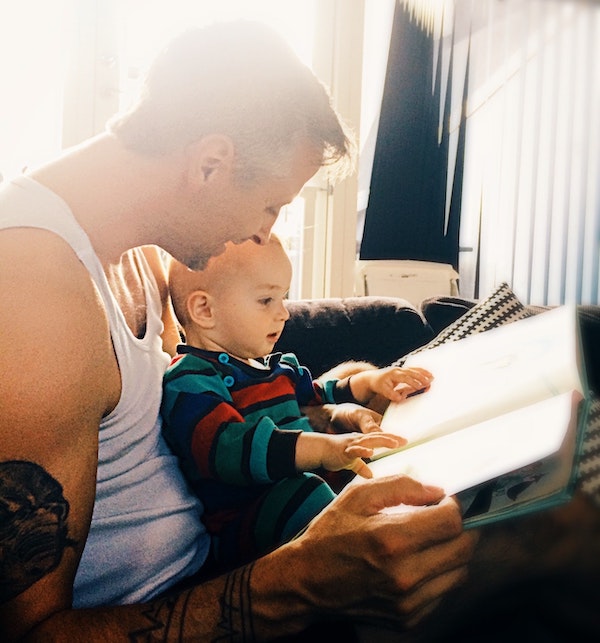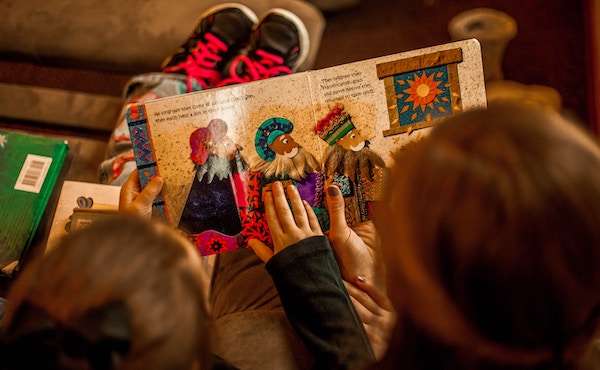There are over a hundred studies that collectively prove that reading aloud to the baby has profound benefits.
Sure, your cutie is most likely going to treat the book just like another chew toy. Still, the American Academy of Pediatrics says that reading to babies not only promotes their natural ability to learn in the future. But it also increases their odds of being successful in life.
And just in case you felt that it’s too early to start reading to baby, a 2014 policy statement by the AAP recommends parent-baby home reading from as early as birth and at least up to kindergarten.
But what exactly are the benefits of reading to the baby? Is there a specific way to do it?
Reading To Baby – Benefits

1. It Promotes Bonding
Bonding – the intense attachment between parent and baby – is an essential human instinct that gradually creates a sense of self-esteem and confidence in the baby. It’s also a critical building block that greatly determines how the baby will interact with other people in his/her life.
While there are various ways of creating this vital closeness with the baby, reading is viewed as one of the most important alongside talking, singing, and touching.
By reading aloud to the baby, even hours after birth, you introduce him/her to your comforting voice. Considering all the changes that are going around in your baby’s life, hearing the same voice that the baby could hear while in the womb will help in developing a secure attachment bond that is vital for the baby to feel secure and understood.
Also when reading to the baby, he/she enjoys the rhythm of your voice and your heartbeat and also gets familiar to your natural scent. Over time, your little one starts associating books with a nurturing bond with you.
2. It Expands Their List Of Vocabularies
Vocabulary development in babies has a significant impact on their ability to interact with others and making their intentions and needs to be known. In other words, reading to the baby grants them a voice of their own.
Experts tell us that brain development in babies occurs during the first 5 years. And this means that there’s no better time to help develop their language skills and expand their vocabularies.
Lots of studies show that exposing babies to a breadth of vocabularies during their early years of life can have a profound impact on their language and speech skills as well as intellectual development.
Although it’s somewhat as beneficial as talking to the baby, reading from a book adds lots of other vocabularies that the baby might rarely hear when you are simply talking to him/her.
While using rich, expressive language is highly recommended, you could jumpstart your days’ old infant to reading by using pictures and sharing more information about places and people in the book.
3. Sets The Stage For The Art Of Reading & School Readiness
Many parents often ask, “how can I help my child who is struggling to read?”. A common answer from most experts is reading aloud to the child.
Perhaps what most parents and caregivers don’t understand is that reading is a complex art that starts at infancy.

Besides being a special bonding time, reading aloud to the baby helps in cultivating the core skills required for future self-reading including:
- Phonemic awareness – ability to hear, identify, and successfully manipulate different sounds that make a word. This will be a boon to being able to read and spell in kindergarten through second grade
- Phonics – the ability to understand sounds and associate sounds of particular letters in words
- Fluency – being able to read aloud with the required speed and with understanding and accuracy
4. Boosts Their Brain Power
We’ve heard more than enough times that reading is a form of workout for the brain. But what’s more, is that reading aloud to babies makes them smarter too.
Research done by the Pediatric Academic Societies (PAS) through MRI technology has shown that early exposure to reading boosts activity in parts of the brain related to verbal development, image development, and reading skills development.
In this study, the researchers found out that in pre-kindergarten kids who were read to often at home, the areas of the brain that are involved with imagery had a higher level of activity. This development is responsible for boosting visualization skills that enable the schooler to ‘see the story’- a key skill to academic success.
5. Stimulates Their Cognitive Thinking Skills
In addition to boosting brainpower, the brain-stimulating activities caused by reading also accelerate your baby’s awareness of colors, textures, sounds, and general surroundings. It has also been shown to slow the rate of mental decline in old age.
When should I start reading for the baby?
You don’t need to wait until the child begins to talk for you to introduce learning. You can do it right after birth. Babies are born ready to learn about themselves and the world. No wonder experts say that it’s never too early to nurture the baby’s early literacy skills.
Important Tips For Reading To Baby

1. Snuggle Up When Reading
Always hold the baby close to you and read the book together. This closeness brings a sense of security and safety and the baby also enjoys your voice. Over time, this will cultivate confidence and love for books in the child.
2. Just A Few Minutes Is Okay At First
Don’t be under pressure to complete the story in the first sitting especially if you are reading for an infant or toddler- they might not concentrate that long, anyway.
When reading for babies, just a few minutes will do. As they get older, children can sit for longer and decide how much time you can read for them. In addition, remember it’s okay to skip some of the pages.
3. Choose Baby-Friendly Books
The right type of book to read for your young one will depend on his/her age. For a toddler consider a book with brightly colored pictures of objects and shapes.
You could also get books that introduce counting, colors, shapes, and letters. The books should have simple texts and a lot of repetition and rhyming.
For a preschooler, choose books with:
- Big and bright illustrations
- Books that help answer the ‘why’ questions in your child’s world
- Activity books involving exploration, observation, and play
- Storybooks with basic plots
4. Show The Child Each Word
Reading alone is not enough. Running your finger along each word will help the baby in associating the sound with the letters. It will also help them learn a lot about reading speed.
5. Add Live To The Story
Reading to the baby is all about helping them experience the world of the characters in the story. The best way to do this is to create appropriate voices for each story character besides using your body to bring the story to life.
6. Place The Books Within The Baby’s Reach
You want to cultivate a culture of reading to the baby. So, ensure that you keep the books where he/she can reach them.
Remember, however, that the baby might view it as an after-dinner snack. That’s to say that you want to ensure that the books are safe for the infant.
7. Make Reading A Daily Routine
Making it a routine to read a book with your baby, for instance, each night before nighttime will help weave the reading culture in your child’s everyday life.

